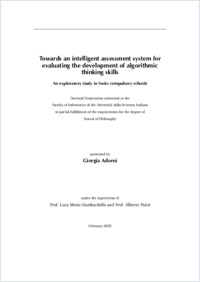Towards an intelligent assessment system for evaluating the development of algorithmic thinking skills : an exploratory study in Swiss compulsory schools
- Adorni, Giorgia
- Gambardella, Luca Maria (Degree supervisor)
- Piatti, Alberto (Degree committee member)
- 2025
PhD: Università della Svizzera italiana
Computational thinking
Algorithmic thinking
Competencies assessment
Intelligent assessment systems
Skills development
Computer science education
Learning technologies
English
The rapid digitalisation of contemporary society has profoundly impacted various facets of our lives, including healthcare, communication, business, and education. The ability to engage with new technologies and solve problems has become crucial, making computational thinking (CT) skills, such as pattern recognition, decomposition, and algorithm design, essential competencies. In response, Switzerland has undertaken considerable research and initiatives aimed at integrating CT into the educational system, preparing students for the digital age. This research aims to contribute to these efforts by developing a comprehensive framework for large-scale assessment of CT skills throughout the Swiss compulsory education system, with a particular focus on algorithmic thinking (AT), which pertains to the ability to design algorithms. To achieve this, we first developed a competence model that captures the situated and developmental nature of CT, enabling the design of activities tailored to varying cognitive abilities, learner age, and the contexts in which they occur. This framework not only clarifies how the characteristics and components of these activities influence the development of CT competencies but also provides guidance for effectively assessing them. A key contribution of this research is the development of an assessment activity to measure AT skills on a large scale. The activity is designed in two variants: one uses non-digital artefacts (unplugged format) and provides a manual expert assessment, while the other relies on digital artefacts (virtual format), automating the assessment process. To provide a more comprehensive evaluation of students’ competencies, we developed an Intelligent Assessment System based on Bayesian Networks with noisy gates, which offers real-time probabilistic assessment for each skill rather than a single overall score. The results of this study indicate that the proposed instrument can measure AT competencies across different age groups and educational contexts in Switzerland, demonstrating its applicability for large-scale use. The findings suggest that AT competencies exhibit a progressive development, with no overall gender differences, though variations are observed at the school level. Several factors, including the type of artefact-based environment and the situated context, influenced AT performance significantly. These results underscore the importance of creating assessment tools that are both accessible and adaptable to various contexts. Additionally, they highlight the need for careful and nuanced interpretation of the data, considering the diverse factors that may impact student performance and the validity of the assessments across different settings. In conclusion, this instrument holds significant potential for integration into real classroom settings, providing a scalable solution for assessing AT skills across a wide range of educational environments.
- Collections
- Language
-
- English
- Classification
- Computer science and technology
- License
-
License undefined
- Open access status
- green
- Identifiers
-
- NDP-USI 2025INF003
- ARK ark:/12658/srd1331504
- URN urn:nbn:ch:rero-006-122777
- DOI 10.48550/arXiv.2503.22756
- Persistent URL
- https://n2t.net/ark:/12658/srd1331504
Statistics
Document views: 338
File downloads:
- 2025INF003: 1406
